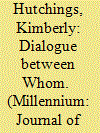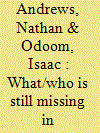| Srl | Item |
| 1 |
ID:
105926


|
|
|
|
|
| Publication |
2011.
|
| Summary/Abstract |
There is a politics to the West/non-West distinction that is bound up with predominant models for dialogue in IR; rethinking these models of dialogue implies a new politics, and therefore also, I will suggest, a move away from the West/non-West binary as a way of characterising the participants in dialogic exchange oriented towards the expansive transformation of disciplinary imaginaries.
|
|
|
|
|
|
|
|
|
|
|
|
|
|
|
|
| 2 |
ID:
176536


|
|
|
|
|
| Summary/Abstract |
In a field that is so loosely theorised, an investigation into intra-GCC conflict is both apposite and challenging. Empirically, interventions by Gulf states have proliferated across the GCC and MENA since 2011. This Special Issue seeks to fill a void in scholarship by looking at the ongoing crisis through the lens of norms. A hypothesised ‘normlessness’ has taken root: a collapse of (local) guiding principles, some even laid down by member states. Disregard for norms of non-intervention, popular sovereignty, mediation, alliance-making and social solidarity poses risks for (sub)regional stability. Provisionally, one notable weakness lies in prescriptive and proscriptive (regulative) norms pertaining to intra-GCC rules of engagement.
|
|
|
|
|
|
|
|
|
|
|
|
|
|
|
|
| 3 |
ID:
151484


|
|
|
|
|
| Summary/Abstract |
This paper engages with non-Western, specifically African, scholarship and insight with the goal of highlighting the importance of African contributions to IR theorising. We highlight the Western dominance in IR theorising and examine the inadequacy of the major analytical constructs provided by established IR theory in capturing and explaining shifting reality in Africa. We argue that African insights, experience and ideas present a challenge to dominant IR constructs and knowledge within the international system, and that these insights, when taken seriously, would enrich our understanding of IR. We show this by problematising some central (often taken-for-granted) IR concepts such as the state, liberalism and individualism and underscore the need to reconstruct more encompassing ‘stories’ and images to innovate, revise and potentially replace some of the conventional ‘stories’ that have been told in IR.
|
|
|
|
|
|
|
|
|
|
|
|
|
|
|
|
| 4 |
ID:
155730


|
|
|
|
|
| Summary/Abstract |
A decade ago in 2007 we published a forum in International Relations of the Asia-Pacific (IRAP) on ‘Why there is no non-Western IR theory?’. Now we revisit this project ten years on, and assess the current state of play. What we do in this article is first, to survey and assess the relevant literature that has come out since then; second, to set out four ways in which our own understanding of this issue has evolved since 2007; third to reflect on some ways in which Asian IR might contribute to the emergence of what we call ‘Global IR’; and fourth to look specifically at hierarchy as an issue on which East Asian IR scholars might have a comparative advantage. Our aim is to renew, and perhaps refocus, the challenge to Asian IR scholars, and our hope is that this will contribute to the building of Global IR.
|
|
|
|
|
|
|
|
|
|
|
|
|
|
|
|